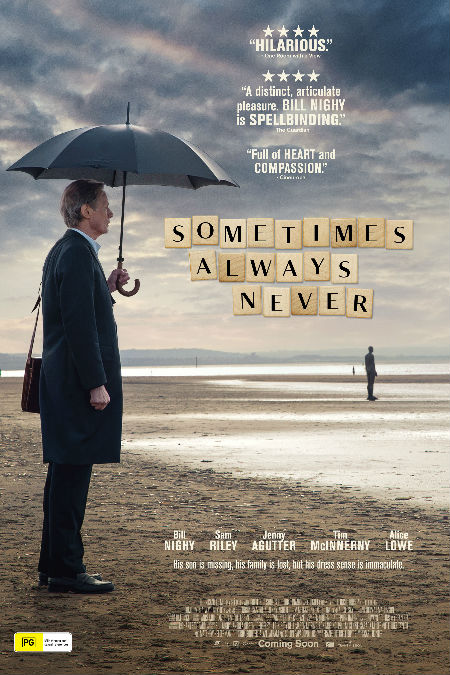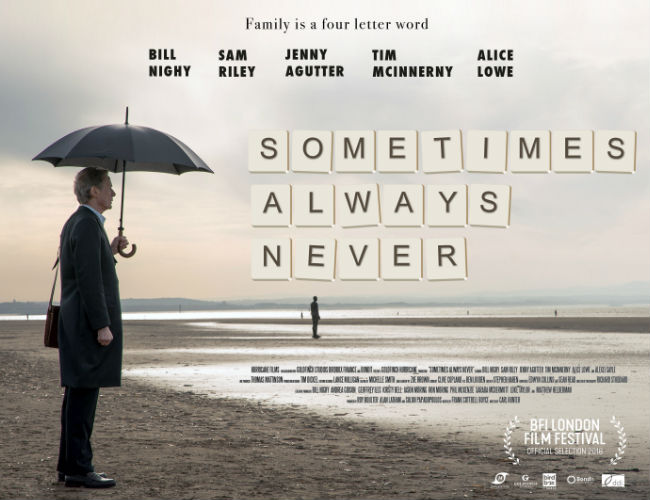
Movies about grief and loss often seem to exist in an entirely different plane of existence to everyday life – part of it but set apart, always feeling like they are a captured moment in time, a still life of sadness that will never rejoin the ebb and flow that courses around them with a vitality long absent from it.
To be fair, that is often how grieving feels, but in Carl Hunter’s charmingly-offbeat tale of one man grieving his missing son and the family ill at ease because of it, Sometimes Always Never, the idea of grief and day-to-day life never really mixing is thrown quirkily on its head, resulting in a film that delightfully subverts your expectations.
Sporting a beguiling visual aesthetic that is reminiscent of both Wes Anderson and Michel Gondry, and willing to be poetically off kilter when it suits, the film manages to be both movingly affecting and quirky all at once, in ways that may leave you disoriented at first but quickly feeling entirely natural.
Key to this delicate balancing act is Bill Nighy as Alan, an impeccably-dressed Scrabble-master who operates a shop in the same town where his son Peter (Sam Riley) and his family live, and who spends much, if not all of his off time either leaving fliers about his missing son Michael on cars and streetlight posts, walking around various neighbourhoods searching for the “prodigal son”, or playing a word game online.
In many ways, it’s an insular existence, despite his willingness to talk to anyone and everyone, usually about the most arcane facts – his mastery of words and general knowledge are the key to his prowess at Scrabble – and while he is in contact with Peter, his daughter-in-law Sue (Alice Lowe) and his grandson Jack (Louis Healy), you would hardly call their relationships close, though they are cordial.

For the most part, anyway.
Father and surviving son keep butting heads, not in any nasty way, but in a manner that suggests a benign estrangement that neither is entirely sure how to fix.
It’s on full display at the start of the film, which plunges us into a road trip, complete with visuals that make it look the two men are travelling in a toy car against a cartoon background, where Peter is constantly making quietly-snide remarks about some or other eccentric mannerism of his father.
Alan is well aware he is being mocked, but seems unable or unwilling to bring the issues out into the open, his only concern being where Michael may be and whether he is “Skinny Thesaurus”, a player on the word game site who is using the same kinds of words and tactics as his missing son, might be a familial cry for help and contact.
The thing is, Alan does love his son, daughter-in-law and grandson – the latter undergoes a quiet sartorial and social revolution of sorts throughout the film, thanks largely to a renewed bond with his grandfather, resulting in finally being able to speak to a girl he likes, Rachel (Ella-Grace Gregoire) – in his own strangely offbeat way but can’t take his mind off Michael long enough to fully relate to them, or to build the kind of relationships all of them need but never fully articulate.
It’s the underlying strength and warmth in these relationships, borne of people who like and love each other but can’t quite bridge the yawning gap between feelings and execution, that gives the film so much of its heart.
In fact, as the film bustles along in its cheerily off kilter way, rooted in our reality but feeling magically real and offset from it at the same time, this sense of connection and belonging finally begins to find some traction, with father and son especially taking the necessary steps to talk about what has hitherto been simply unexpressed loss and disconnection.
This is where the Bible’s story of the prodigal plan becomes a key part of the narrative, exploring as it does the fact that the son who ran away gets all the attention and the rewards on his return (or not in the case of Michael who never reappears and likely never will) while the faithful one who stays behind, who stays connected, gets pretty much ignored.
Once Peter finally begins expressing his aching sense of loss and dislocation to his father, and Alan comes to realise that he has disappeared into that set apart world of grief and mourning to the exclusion of everything and everyone else in his life, things begin to change.
Not that Sometimes Always Never (the title refers to the three buttons on a single-breasted suit which should be done up, top to bottom, according to the three word prompt), rather happily (and it is very funny in many ways), makes too much of it.
At least, not like most movies with this kind of thematic focus.
Rather, it lets the family rapprochement happen quietly, meaningfully and unspectacularly, adorned with all kinds of quirky visual and verbal theatrics, to the point where the family’s reassembling happens almost without you noticing.
It feels quite natural and normal, magically real flourishes aside – they are brief, well-placed and never overshadow the humanity of the film – and as each member, especially Alan who never makes a thing of his changing outlook and mindset, preferring to let it express itself as the changes trickle through and his innate love and concern for his wider family reasserts itself once more, come together again, we witness what it is like when what is lost stops dominating, though it is never forgotten, and what is present is allowed to be noticed and lived out once again.
Sometimes Always Never is an original piece of work that may look daffy and quirky, and in many highly-enjoyable ways most certainly is, but which radiates a heartwarming truth at its core, which is that while grief can be understandably all-consuming, it is all too easy to lose ourselves in it to the detriment of the very people close to us who can, and will be, instrumental in our healing and who are longing for the type of intimate connections upon which life depends and which matter most of all.